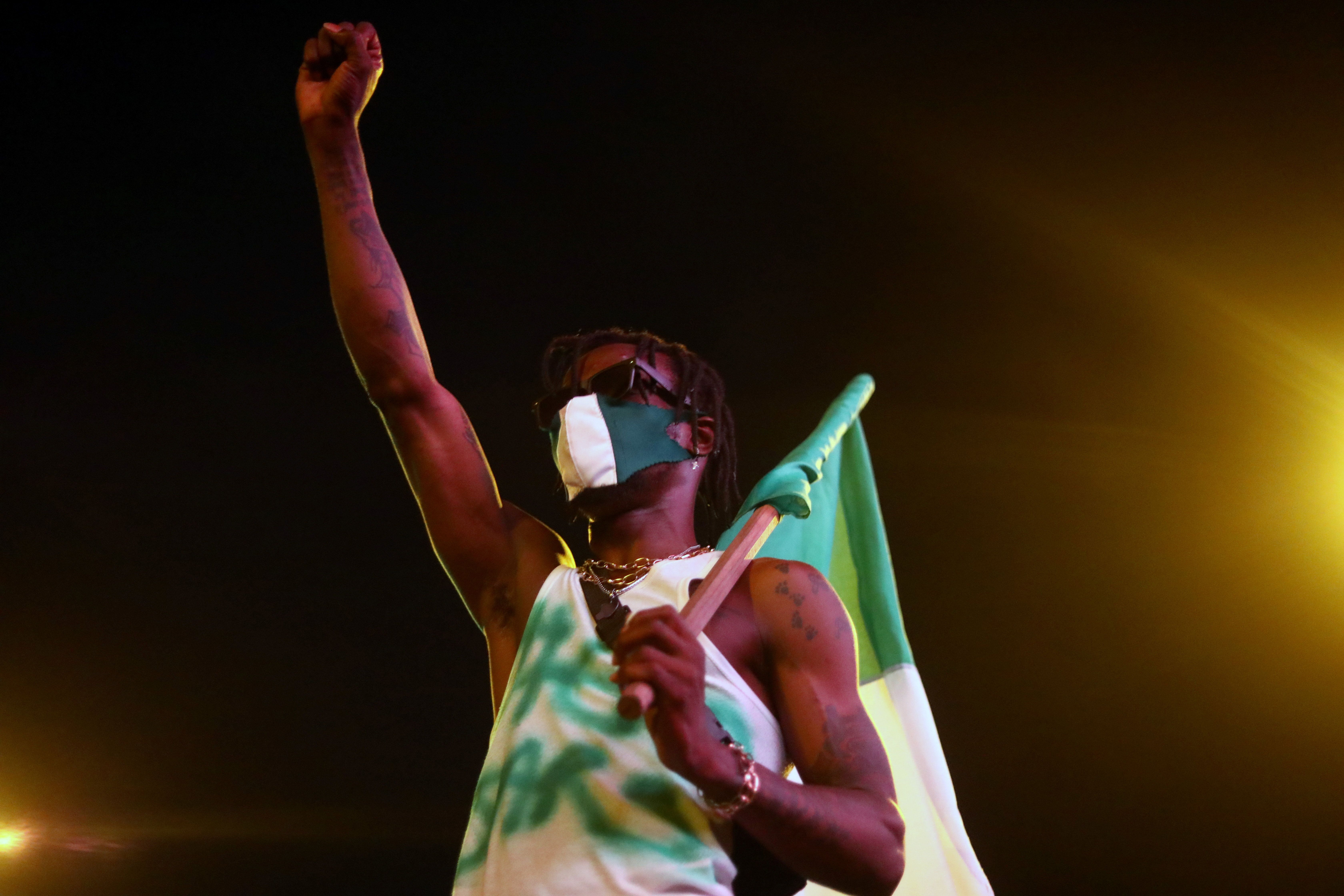October 20, 2020
Nigeria, the most populous country in Africa, has been rocked for two weeks by major unrest, as youth-led groups have hit the streets to protest police brutality and the lack of jobs. The demonstrations caught authorities by surprise — could they herald a broader and more permanent shift in which young Nigerians demand a bigger say in shaping their country's future?
#EndSARS. The rallies began on October 5 in Edo and Delta states over a viral video of a man being beaten to death by alleged members of the notorious Special Anti-Robbery Squad (SARS), and soon spread to Lagos, the country's largest city and economic hub. Hundreds of activists demanded the government disband the famously trigger-happy federal police unit, accused of hundreds of extrajudicial killings since it was established in 1992.
Just days later, the protests ballooned to tens of thousands of people and expanded to other cities and the capital, Abuja. The hashtag #EndSARS became immensely popular on social media and captured global attention from the Nigerian diaspora in Europe and the Americas, as well as celebrities and influencers in the US, including Black Lives Matter.
Faced with mounting pressure, President Muhammadu Buhari — a former general who led a military junta that ruled Nigeria in the early 1980s but was elected as a civilian in 2015 — agreed to disband SARS. But rather than calm the streets, it has energized a new generation of protesters whose grievances go well beyond police brutality alone.
Jobless youth. Although Nigeria is one of the world's top oil producers, corruption and economic mismanagement have squandered that wealth for decades. The economic impact of COVID-19 has only made things worse, as the oil sector — which accounts for 60 percent of government revenues and is the key to any economic recovery — is suffering a pandemic-fueled global slump in commodity prices.
The current economic crisis has hit the youth particularly hard, with a whopping 63 percent of Nigerians under 30 now jobless or underemployed, eight percentage points higher than the overall working-age population. (It's hard to know what the youth labor market looked like immediately before the pandemic, since the last statistics are from the third quarter of 2018).
A generational shift in the making. More than half of Nigeria's 206 million people are under 30, and the median age is 18.4. But young Nigerians have been politically disengaged for generations in a country where turnout for national elections rarely exceeds 40 percent.
But if the current protests do boost youth voter engagement, there could be big consequences down the line. Young Nigerians tend to favor action on economic and social justice instead of the traditional GDP growth and security issues that establishment politicians now focus on.
Ahead of the 2023 general election, any party that can tap into this politically dormant giant constituency would be very competitive in ways that could fundamentally change Nigerian politics.
What happens next? As the protests continue despite a curfew in Lagos and under the watchful eye of anti-riot police, the security forces are getting anxious. Activists have accused the cops of deploying armed thugs to break them up, while the army has already threatened to intervene. Whether or not there's a crackdown, young Nigerians have thrown down the gauntlet — and they will be a political force to be reckoned with sooner than you think.More For You
An employee works on the beverage production line to meet the Spring Festival market demand at Leyuan Health Technology (Huzhou) Co., Ltd. on January 27, 2026 in Huzhou, Zhejiang Province of China.
Photo by Wang Shucheng/VCG
For China, hitting its annual growth target is as much a political victory as an economic one. It is proof that Beijing can weather slowing global demand, a slumping housing sector, and mounting pressure from Washington.
Most Popular
Two Iranian motorcyclists stop in front of the burned East Tehran General Directorate of Tax Affairs headquarters in Tehran, Iran, on January 21, 2026.
Photo by Morteza Nikoubazl/NurPhoto
30,000: The estimated death toll in Iran during the protests at the start of the year, per local health officials, underscoring the scale of the Islamic Republic’s crackdown on its own citizens.
The World Health Organization (WHO) headquarters is seen in Geneva, Switzerland, January 28, 2025.
REUTERS/Denis Balibouse
Seventy-eight years after helping found the World Health Organization (WHO), the United States has formally withdrawn from the agency, following through on a pledge President Donald Trump made on his first day back in office.
Mastercard Economic Institute's Outlook 2026 explores the forces redefining global business. Tariffs, technology, and transformation define an adaptive economy for the year ahead. Expect moderate growth amid easing inflation, evolving fiscal policies, and rapid AI adoption, driving productivity. Digital transformation for SMEs and shifts in trade and consumer behavior will shape strategies worldwide. Stay ahead with insights to help navigate complexity and seize emerging opportunities. Learn more here.
© 2025 GZERO Media. All Rights Reserved | A Eurasia Group media company.
